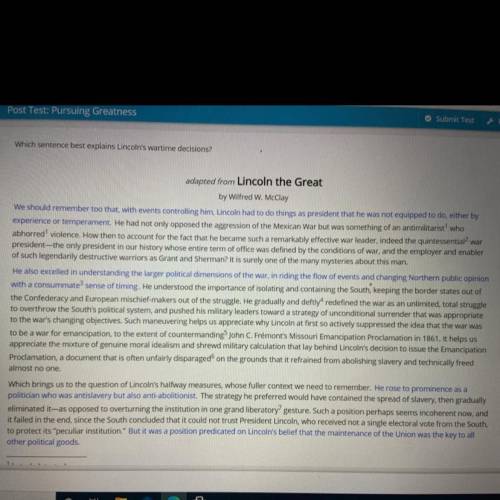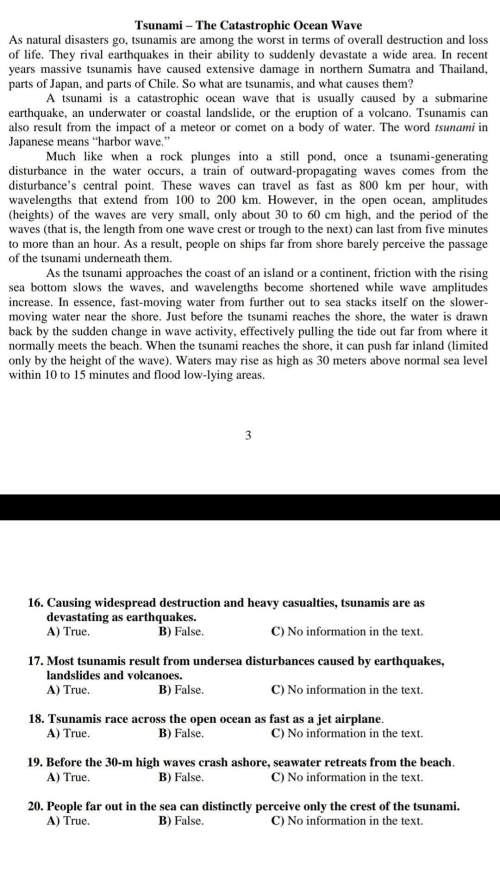Which sentence best explains Lincoln's wartime decisions?
BRANLIEST
adapted from Lincoln the...

English, 01.04.2021 17:30 cassidy32504
Which sentence best explains Lincoln's wartime decisions?
BRANLIEST
adapted from Lincoln the Great
by Wilfred W. McClay
We should remember too that, with events controlling him, Lincoln had to do things as president that he was not equipped to do, either by
experience or temperament. He had not only opposed the aggression of the Mexican War but was something of an antimilitarist who
abhorred' violence. How then to account for the fact that he became such a remarkably effective war leader, indeed the quintessential war
president--the only president in our history whose entire term of office was defined by the conditions of war, and the employer and enabler
of such legendarily destructive warriors as Grant and Sherman? It is surely one of the many mysteries about this man.
He also excelled in understanding the larger political dimensions of the war, in riding the flow of events and changing Northern public opinion
with a consummate sense of timing. He understood the importance of isolating and containing the South, keeping the border states out of
the Confederacy and European mischief-makers out of the struggle. He gradually and deftly redefined the war as an unlimited, total struggle
to overthrow the South's political system, and pushed his military leaders toward a strategy of unconditional surrender that was appropriate
to the war's changing objectives. Such maneuvering helps us appreciate why Lincoln at first so actively suppressed the idea that the war was
to be a war for emancipation, to the extent of countermanding John C. Frémont's Missouri Emancipation Proclamation in 1861. It helps us
appreciate the mixture of genuine moral idealism and shrewd military calculation that lay behind Lincoln's decision to issue the Emancipation
Proclamation, a document that is often unfairly disparaged on the grounds that it refrained from abolishing slavery and technically freed
almost no one.
Which brings us to the question of Lincoln's halfway measures, whose fuller context we need to remember. He rose to prominence as a
politician who was antislavery but also anti-abolitionist. The strategy he preferred would have contained the spread of slavery, then gradually
eliminated it-as opposed to overturning the institution in one grand liberatory gesture. Such a position perhaps seems incoherent now, and
it failed in the end, since the South concluded that it could not trust President Lincoln, who received not a single electoral vote from the
South,
to protect its "peculiar institution." But it was a position predicated on Lincoln's belief that the maintenance of the Union was the key to all
other political goods.


Answers: 3


Another question on English

English, 21.06.2019 20:20
What evidence could be used to support the authors'claims in this excerpt? select three options.- tweets (twitter messages) describing the overthrow ofben ali at the time it happened- verifiable facts that explain that social media haslittle effect on citizen journalism-speeches that give biographical accounts of the life andaccomplishments of mubarak-journal entries from a student describing how socialmedia him join a protest- quotations from experts on social media use duringuprisings within the arab world
Answers: 1

English, 22.06.2019 03:00
Is directly communicated and requires little interpretation
Answers: 1

English, 22.06.2019 03:00
Read the excerpt from the poem "growing up italian" by maria mazziotti gillan and answer the question that follows. when i was a little girl, i thought everyone was italian, and that was good. we visted our aunts and uncles, and they visted us. the italian language smooth and sweet in my mouth. in kindergarten, english words fell on me, thick and sharp as hail. i grew silent, the italian word balanced on the edge of my tongue and the english word, lost during the first moment of every question. source: gillan, maria mazziotti. "growing up italian." poetrymagazine.com. poetry magazine, n.d. web. 30 mar. 2011. what is the tone of this poem? what does the tone reveal about the speaker of the poem and the conflict she faces? based on this excerpt, what can you predict about the theme of the poem?
Answers: 1

English, 22.06.2019 08:30
Freedoms" speech. i have called for personal sacrifice. i am assured of the willingness of almost all americans to respond to that call. a part of the sacrifice means the payment of more money in taxes. in my budget message i shall recommend that a greater portion of this great defense program be paid for from taxation than we are paying today. no person should try, or be allowed, to get rich out of this program; and the principle of tax payments in accordance with ability to pay should be constantly before our eyes to guide our legislation. what argument is roosevelt supporting with his appeal to logic in the underlined section of the excerpt? if americans are willing to trust roosevelt, it only makes sense that he will ensure that the tax money is well managed. if americans are willing to make a personal sacrifice, it only makes sense that they will be seen as both noble and patriotic. if americans feel it is right to enter the war, it only makes sense that they will have to pay more in taxes to cover the costs. if americans feel it is right to pay more taxes, it only makes sense that they should also agree it is right to enter the war.
Answers: 1
You know the right answer?
Questions






Mathematics, 06.05.2020 06:19


Chemistry, 06.05.2020 06:19

History, 06.05.2020 06:19


Geography, 06.05.2020 06:19

Mathematics, 06.05.2020 06:19


Health, 06.05.2020 06:19

Mathematics, 06.05.2020 06:19

Mathematics, 06.05.2020 06:19


Mathematics, 06.05.2020 06:19





